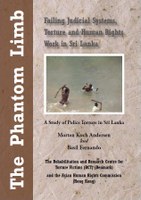The Phantom Limb: Failing Judicial Systems, Torture and Human Rights Work in Sri Lanka
VIEW ALL BOOKS [Foreword] This study is a result of the cooperation between the Asian Human Rights Commission (AHRC) and the Rehabilitation and Research Centre for Torture Victims (RCT).
[Foreword] This study is a result of the cooperation between the Asian Human Rights Commission (AHRC) and the Rehabilitation and Research Centre for Torture Victims (RCT).
The study was done in January 2008 and the data was processed during April and May 2008 at the AHRC office in Hong Kong. The idea and outline of the study was developed by Basil Fernando of the Asian Human Rights Commission and the processing and analysis of the data and the writing of the report was completed by Morten Koch Andersen of RCT.
The study seeks to explore the routine use of torture by the police and illuminate the widespread violence and human rights violations that are part of everyday life in Sri Lanka. It seeks to show the apparent neglect of the Sri Lankan state to stop these atrocities and provide adequate protection and remedies for the victims by ignoring publicly available information provided by state commissioned investigations and reports on the continuously declining state of affairs in the police force and the general deteriorating of human rights in the country.
Much human rights reporting that focus on crisis and immediate risks, dangers and sufferings tend to overlook historic processes and social ordering systems – such as caste – in their (often case based) illustrative descriptions of repressive practices, misuse and mismanagement of authority and the inadequacy of the justice system to protect the citizens. However, it is the proposition of the study that to investigate torture practices and the apparent inability to change the current state of affairs one has to explore the logics based in deep rooted social systems and attitudes. This insight offers an explanation for the socioeconomic bias in the enactment of torture and the reluctance and resistance to change in the criminal justice and political system. In this regard, caste as an ever present social ordering system in South Asia and Sri Lanka appears to be a viable and fundamental issue to include in the analysis to understand current human rights abuses.
The argument is that a ‘debris’ of the caste system somehow orders social perceptions, relations and actions in the unfolding of the criminal justice system, especially in the images of the mariginalized laboring poor. To do this, we will look into the interconnectedness of the early judicial system and administration and the caste system.
Published in November 2009 jointly by the Asian Human Rights Commission (AHRC), Hong Kong and the Rehabilitation and Research Centre for Torture Victims (RCT), Denmark. 80 pages, Language: English, ISBN: 978-962-8314-47-8, PID: AHRC-PUB-007-2009
For orders and enquiries: Email ahrc@ahrc.asia or call +(852) 2698 6339 +(852) 2698 6339.
Click here to download this publication in PDF format.



